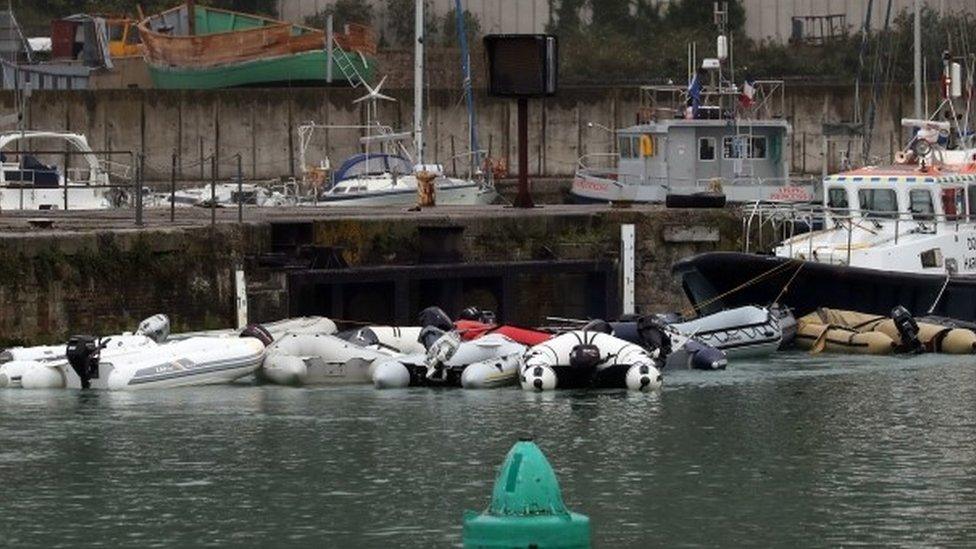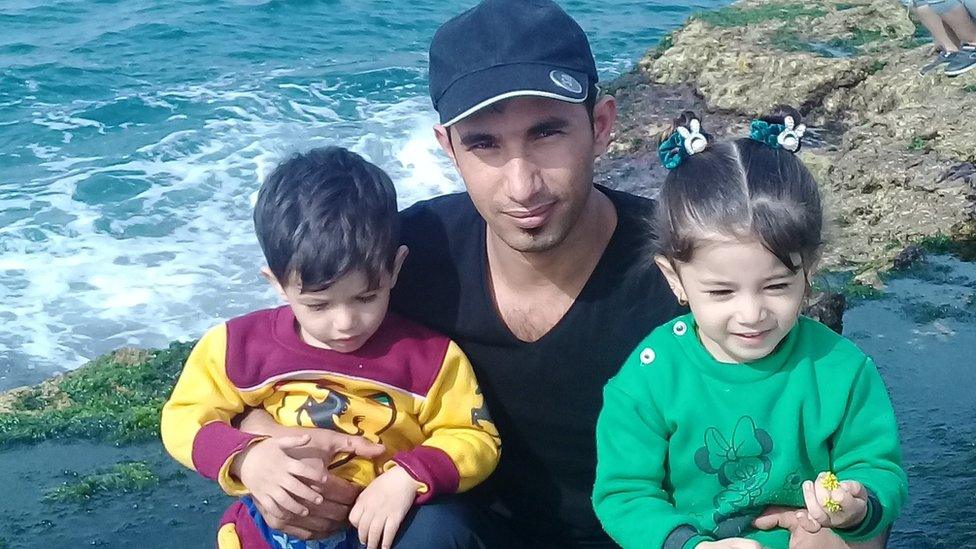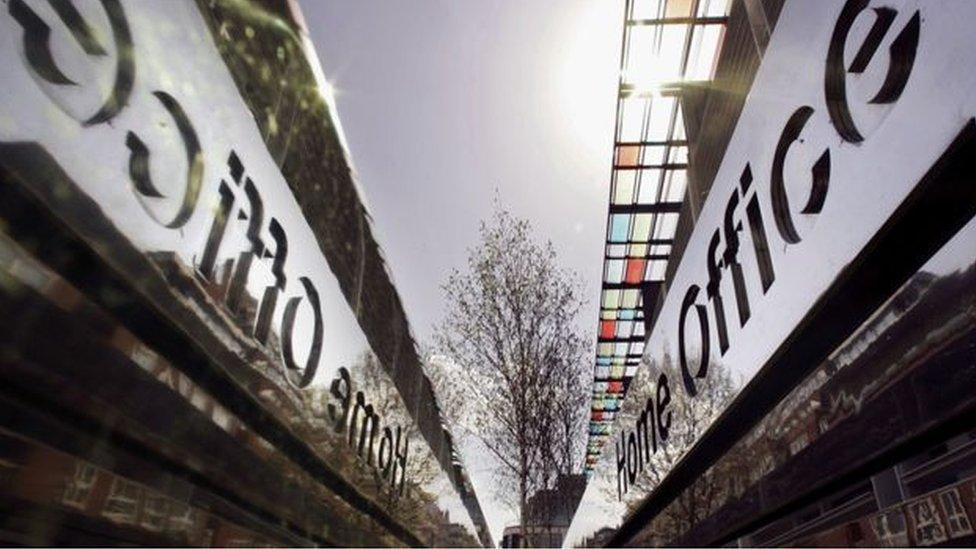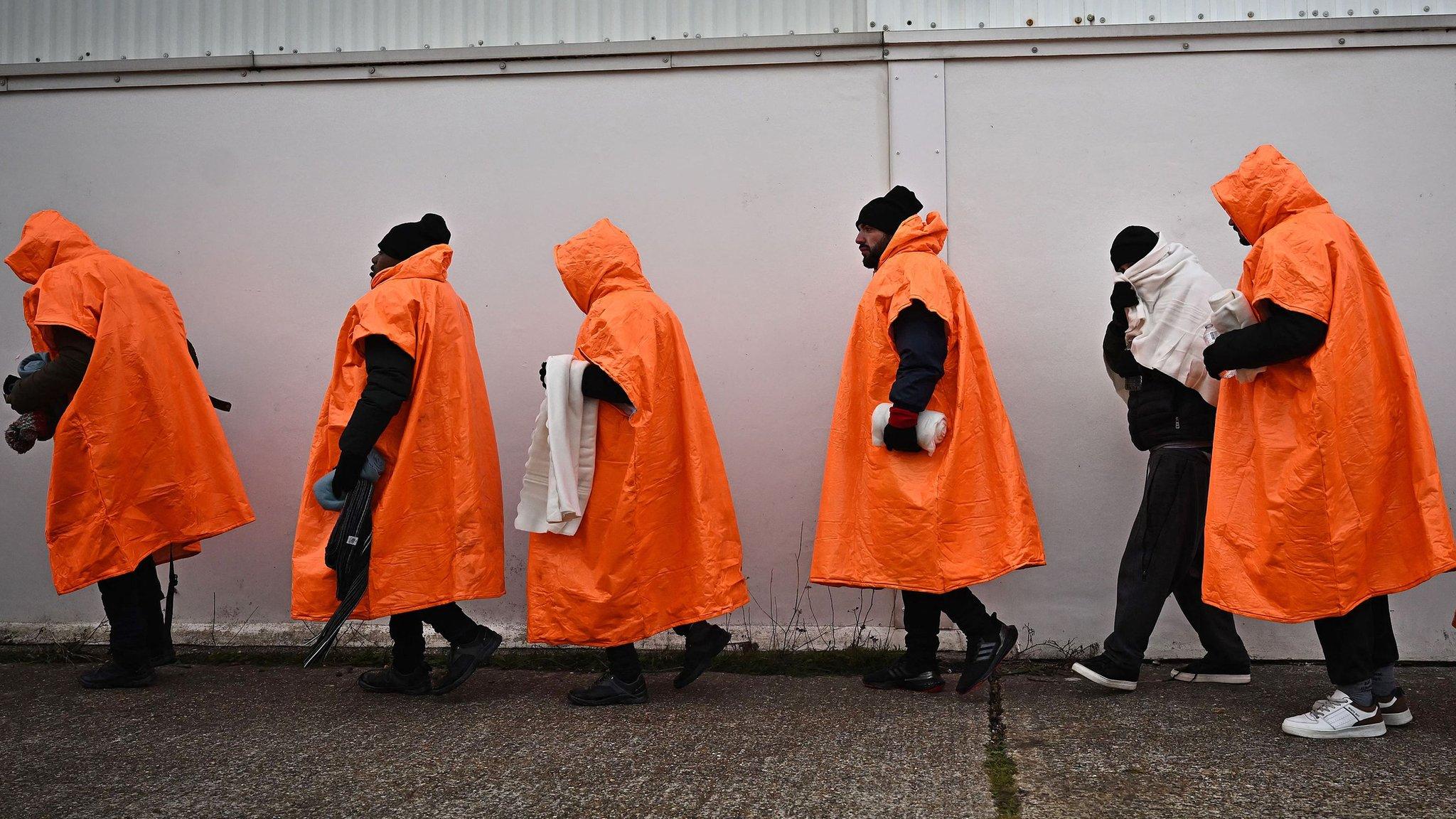Asylum seekers: Human rights lawyers 'not political'
- Published

Small boats in storage after being used to bring migrants across to Dover
The entire legal system was undermined when the home secretary labelled human rights lawyers "activists", Wales' former first minister has said.
Priti Patel blamed "activist lawyers" for legal challenges to prevent the removal of asylum seekers.
Carwyn Jones, who is Member of the Senedd (MS) for Bridgend and a barrister, said: "If we no longer think the courts are fair, the rule of law starts to break down".
The Home Office declined to comment.
A row broke out at the end of August after the Home Office posted an animated video on social media, saying rigid regulations were "allowing activist lawyers to delay and disrupt returns".
This was later withdrawn after criticism from the Law Society.
Ms Patel also referred to activist lawyers in a subsequent tweet.
Allow X content?
This article contains content provided by X. We ask for your permission before anything is loaded, as they may be using cookies and other technologies. You may want to read X’s cookie policy, external and privacy policy, external before accepting. To view this content choose ‘accept and continue’.

Mr Jones, who was once the Welsh Parliament's former chief legal adviser, said: "Saying, 'I don't like the activities of lawyers' is really throwing your toys out the pram because you can't get your own way and if that's the way she behaves she should not be home secretary."
Former Lord Chief Justice of England and Wales, Lord Thomas of Cwmgiedd, also has concerns.
He was one of three judges labelled an "enemy of the people" on the front page of the Daily Mail in 2016 over a decision in the courts regarding Brexit.
"Judges and lawyers have a job to do to maintain our freedoms and you shouldn't attack them for doing so," he said.
"If you try and stop someone's case being argued by attacking lawyers, then you potentially can do real dangers to the rule of law."

Priti Patel has been accused of 'throwing her toys out of the pram' by Carwyn Jones
Ann Evans, a solicitor from Anglesey who works for Duncan Lewis in London, recently represented an asylum seeker at the High Court, where the decision was made to prevent a chartered flight taking 20 asylum seekers to Spain.
"We have evidence to suggest that Syrian asylum seekers recently returned to Spain by the government found themselves homeless, destitute and without access to help," she said.
"And so the question arose whether returning them to Spain was lawful.
"I think the term 'activist lawyer' is used a lot now, but we were just doing our job. The suggestion that we're somehow politically motivated is not the case at all.
"Many of our clients have been through a lot of trauma and they're often vulnerable and can't speak English.
"It's our job to put their case forward where a decision is made by the government that affects them - it's their right to have their case heard before an independent judiciary."
'I would wish for death 15 times a day'
One of Ann's clients, Hassan, told us his story via a translator.
He grew up in the Syrian civil war as a teenager and was studying to be a vet.
But on the day he was due to sit his final exams, the 21-year-old was seized at a checkpoint and beaten in front of his mother and sister. It was the start of 17 days of torture which has left him scarred and traumatised, fearful of returning.
A bag was placed over his head, his hands tied behind his back and he was made to run into walls.
"I could hear noises - scary noises, of torture," he said.
"My imagination went wild - the worst thing was the sound of the females screaming."
Naked, deprived of sleep, food and drink, he would be told to confess.
"To what?" he would ask.
Strung up by his arms from the ceiling he would be beaten - if he fainted, a bucket of water would be thrown over him to wake him before the torture started again.
"I would wish for death 10 or 15 times a day. Death was a comfort compared to what I was going through."
His release after 17 days was sudden. Hassan escaped to neighbouring Lebanon, where he stayed for two-and-a-half years, but recalled being frightened for his safety and, after a brief return to Syria, he looked to escape again.

A Border Force vessel with migrants picked from a boat off the Kent coast in August
The journey which took him to Britain was via Libya, Algeria, Spain and France and at various points he encountered smugglers and traffickers, who he said used violence and threats to put people on overcrowded, sinking boats.
He spent three weeks at a Spanish detention centre - which is why the British authorities are seeking to have him returned there to make his asylum application.
Hassan, now 24, eventually reached Britain and has been housed in Liverpool.
"I always said 'if you have no dreams, then you're not human, really'," he said.
"And if you have limited dreams, then you're a failure, but I'm happy to have limited dreams of safety, protection and to be with my family and a life.
"I still have hope. And so long as there is hope, it's OK."
- Published25 August 2020

- Published30 September 2020

- Published28 August 2020

- Published13 December 2023
